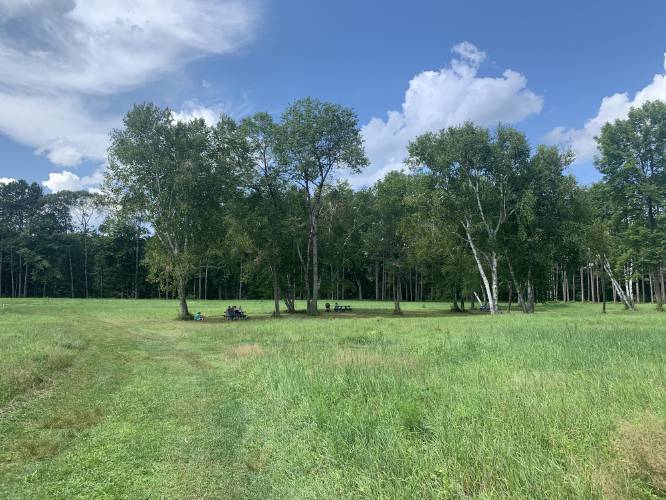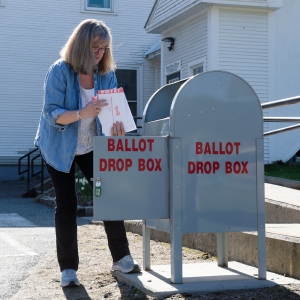River Park developers seek exceptions to ease path for West Lebanon project

People sit at picnic tables last Sunday at River Park in West Lebanon during the Trails + Trucks event. (Valley News — Liz Sauchelli) Courtesy photograph
| Published: 08-16-2023 5:51 AM |
WEST LEBANON — Developers of a long-delayed mixed-use project are asking the city for more flexibility when it comes to required infrastructure improvements so they have more leeway to bring on potential financial partners.
The city Planning Board held a public hearing on Monday to consider two requests by David and Chet Clem, the father-and-son team overseeing River Park, a proposed development on 38 acres between Route 10 and the Connecticut River.
They are asking the city to eliminate an existing requirement that prevents the sale or transfer of lots within the project until infrastructure for the first project phase has been completed.
In addition, the developers are asking the Planning Board to “vest” the River Park project based on the infrastructure work completed to date.
In New Hampshire, once a development project is vested it is protected against future changes in local land use regulations or municipal ordinances.
Under the approved site plan, River Park would be considered vested only after completion of infrastructure required in the first building phase. This includes the construction of a property entrance on Route 10 and a portion of a road through the property.
Lyme Properties, the Clems’ development firm, is asking the Planning Board to amend the site plan by removing these road improvements from the requirement to vest the property.
David Clem said at Monday’s hearing that vesting River Park would provide more assurance to investors by safeguarding against changes in city ordinances or policies that might impact the project’s future development.
Article continues after...
Yesterday's Most Read Articles
Lenders want to know “that you’re not going to be subject to having a $25 million building designed as part of a phased development and suddenly the zoning changes or the site plan regulations change to not allow you to complete (the other phases),” David Clem said.
“It provides us with greater certainty that there will not be continued delays or dragging of feet or further costs incurred,” Chet Clem told the Planning Board.
The site plan for River Park was approved 12 years ago. Since then the project has weathered a long, complicated history of delays, some of which are attributable to the proposal’s size and complexity. The multi-phase construction plan consists of eight buildings totaling 840,000 square feet of retail, office, research and residential space, as well as two parking garages, nine single-family homes and a park with public river access.
The first building, a mix of life sciences lab space, offices and retail, remains unbuilt. Construction has stalled four times since 2016, including a stoppage this year that is still ongoing.
Though the pandemic was responsible for a work postponement in 2020, most of the delays have been due to disagreements between the developers and the city over project regulations and cost agreements.
As proposed, River Park will require a considerable volume of infrastructure to support the development. To date Lyme Properties has spent $1.9 million in construction costs to build new water and sewer lines and an extension of Crafts Avenue into the park.
Chet Clem estimates the remaining construction for the property access and portion of on-site road to cost around $3 million, a total that has increased significantly in recent years due to inflation and the ongoing labor shortage.
“The cost of the overall project has been driven up so much by all these delays that it changes the foundational math of the project for us,” Clem told the board.
The developers also are asking the city to eliminate a requirement that this infrastructure be complete before the developers can sell individual lots.
According to state regulations, the developers must either complete the required infrastructure improvements or have money earmarked and set aside to make those improvements.
David Clem indicated on Monday that Lyme Properties plans to transfer a lot designated to house a 125-unit apartment building to a joint partner — “a well-experienced, national multifamily developer.”
Clem did not identify the name of the firm but said the company will have the controlling ownership of this building.
Clem stressed that they still intend to complete the remaining infrastructure. These proposals to vest the property and to ease the lot restriction are only intended to give more flexibility regarding the timeline to complete it.
“We are trying to parse what we can pay now, what we can delay and what we have to complete and securitize,” Clem said. “We have to (securitize the infrastructure). We’re not asking you to change that.”
Eliminating the lot restriction does not free Lyme Properties from completing the infrastructure, Clem added. On a practical level, the road access is a condition of receiving an occupancy permit for the first building, he noted. He also said that investors will not commit to River Park unless these roadways are built.
After a 90-minute discussion, the Planning Board opted to continue the public hearing to Monday, Sept. 11.
Several board members said they needed more time to process the information, as well as additional information from the Clems regarding the plan to fund the remaining infrastructure.
Lyme Properties also is appealing a city decision to require the approval of a minor site plan for a mobile restaurant located at River Park.
River Park has used the 1920s Worcester dining car in recent years as a pop-up restaurant for public events, including the 2020 Trails and Trucks food truck series.
In addition, a coffee shop had expressed interest in leasing the dining car as a West Lebanon location, according to Chet Clem, who said the coffee vendors later abandoned the idea due to the city’s hesitation to permit the restaurant’s operation.
In April, Deputy Planning and Development Director Tim Corwin told Clem that operating this dining car — which would require connecting it to the water and sewer lines at River Park — constitutes a change to the proposed development and therefore requires approval of a minor site plan.
In his appeal to the Planning Board, Clem contends that submitting a site plan is unnecessary because food service retail — which is planned for another building in River Park — is already an approved use on the property.
This appeal hearing was also continued to the next board meeting on Sept. 11 at 6:30 p.m. at City Hall.
Patrick Adrian may be reached at padrian@vnews.com or 603.-727-3216.

 Students take down pro-Palestinian encampment at UVM
Students take down pro-Palestinian encampment at UVM Sharon voters turn back proposal to renovate school
Sharon voters turn back proposal to renovate school Dartmouth administration faces fierce criticism over protest arrests
Dartmouth administration faces fierce criticism over protest arrests
